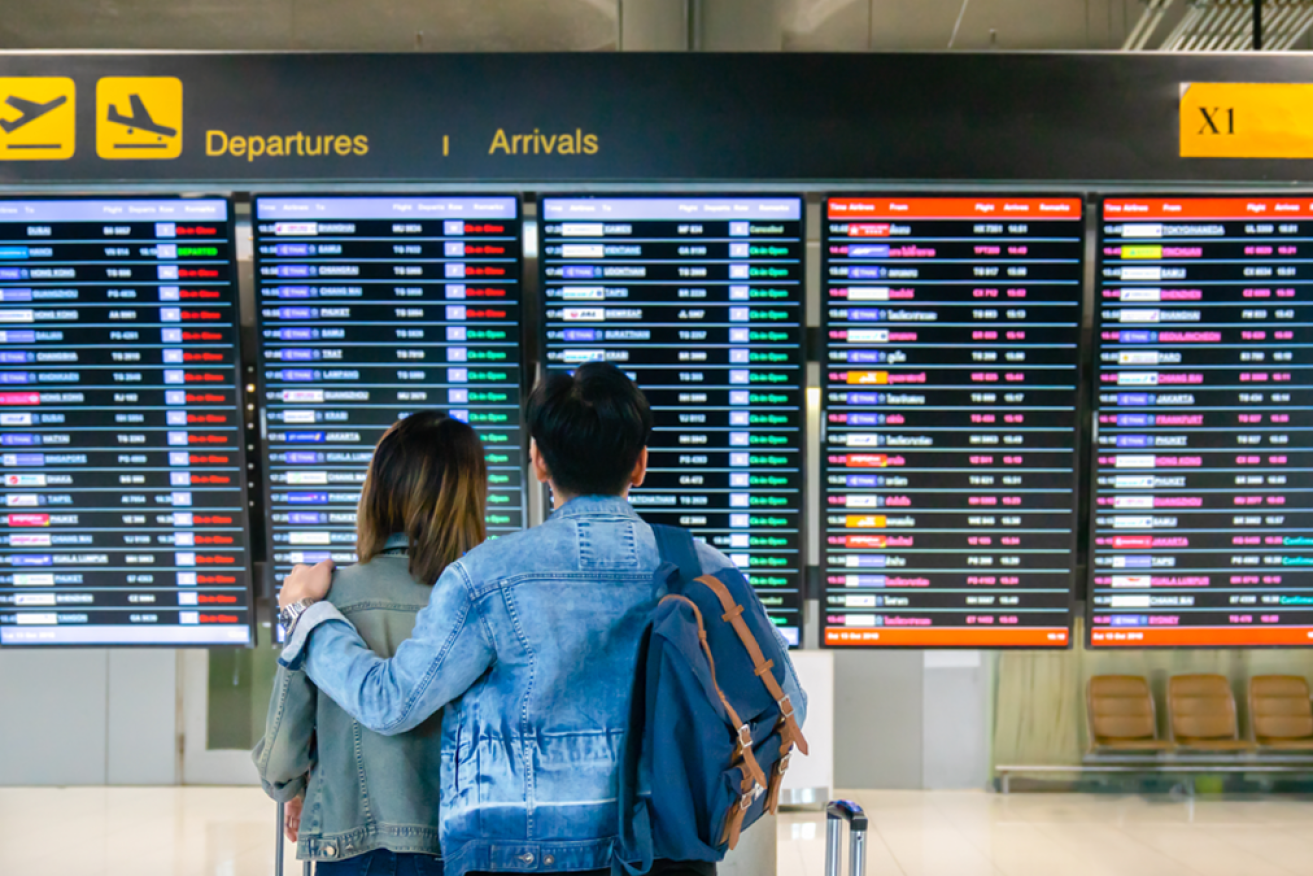International travel is back for the vaccinated. But what are we flying into?

International travel is important to Australians. But international travel currently has additional complexities and risks. Photo: Getty
Increasing vaccination coverage has led to increased confidence by government as well as confidence by the airlines to restart international flights.
But what conditions will we be flying into? What is COVID-19, and life like in the countries we can fly to?
What countries can we visit?
Those arriving or leaving from Australia must be vaccinated with their second dose at least seven days before travel.
For now, two doses are considered fully vaccinated.
However, some countries are saying vaccinations are only valid for certain time periods – only allowing travellers in if they’ve had two doses within the past 12 months, for example, or a third dose, or a documented COVID-19 infection within six months.
Most international flights from Australia are departing from Sydney Airport.
At the moment the destinations are Los Angeles and San Francisco, Singapore, Tokyo, Xiamen (China), Bangkok, Nadi (Fiji), Hong Kong, ICN (Korea), Taipei (Taiwan) and Colombo (Sri Lanka), Abu Dhabi, Dubai, and Doha (Qatar).
As of November 1, fully vaccinated people have been able to travel internationally without an exemption.
Including all ages, 65.3 per cent of Australians are fully vaccinated.
Restrictions and testing requirements differ by country, though commonalities include testing (including children over two years) prior to departure and upon arrival, vaccination certificates and mask wearing on the plane and in airports.
Some countries have quarantine requirements, others do not.
So, what will countries require of arriving travellers, and what are their COVID-19 situations?
Country by country
More than five million people have died from COVID-19 according to Johns Hopkins University, and the rate of transmission is still high around the world.
Many low- and middle-income countries sadly have less than 5 per cent of their populations vaccinated.

Currently, fully vaccinated people can travel internationally without an exemption. Photo: Getty
This article takes a snapshot of three destination countries you could reach from Sydney Airport today: The US, Singapore and Japan.
These three countries show the wide range of circumstances facing would-be travellers, from least restrictive to most.
US
Sydney Airport currently has flights departing to Los Angeles and San Francisco.
From November 8, the US requires all travellers aged 18 and over to be fully vaccinated against COVID-19; unless you are a US citizen or permanent resident.
All travellers aged two and over must have a negative COVID-19 test or proof of COVID-19 infection in the past 90 days, prior to boarding.
In the US 58.1 per cent of the total population is fully vaccinated.
However some states are much lower, such as West Virginia with 41.1 per cent.
The total proportion vaccinated in each country doesn’t tell the whole story about the COVID-19 situation and life on the ground – each country is different.
One important difference for the US is that they have had many more infections, meaning many people have some level of immunity from infection even if they are not vaccinated.
The evidence around this is still evolving, and the level of protection offered by COVID-19 infection itself varies from person to person.
However, it is typically less than the protection offered by vaccination. Australia and multiple other countries recommend getting the vaccine even after infection to ensure the highest possible protection against COVID-19.
Singapore
From November 8, those travelling from Australia can enter Singapore as short-term visitors.
Vaccination should be completed at least two weeks before arrival, and a negative PCR test within 48 hours before departure to Singapore is required.
Visitors also must use the Singapore TraceTogether App, or be given a TraceTogether token.
Singapore has an all-ages vaccination rate of 82.7 per cent – a quarter higher than Australia and more than double the worst US states.
Still, Singapore is subject to continuing public health restrictions as they have been experiencing high numbers of cases and a burdened health system, reflective of their dense population, and low vaccination in seniors.
Japan
Japan has been the most popular destination for short-term travel from Australia for the past few years, after New Zealand at No.1, Indonesia, and then the US, according to the ABS.
Short-term visits to Japan peaked in 2019 at over 522,000 Australians.
Japan isn’t allowing non-resident foreign nationals to travel, and those allowed in will need to enter a 10-day quarantine period.
Booster shots and third doses

Photo: Getty
Having a third dose of the vaccine would be a judicious move before departing to higher-risk countries.
It is now approved and available for those aged 18 years and over in Australia with their last dose more than six months ago.
Australians as part of the global community
Only 3.9 per cent of people in low-income countries have even partial vaccination.
The Australian government has long appreciated that our biosecurity relies on regional biosecurity.
The World Health Organisation’s plan sets out the importance of COVID-19 vaccination for all.
Now Australians should get vaccinated, obtain a third dose when needed and loudly advocate for better vaccine sharing globally.
Getting home safely
International travel is important to Australians.
Many want to visit loved ones, continue with overseas business and/or for leisure.
If travelling for leisure, the good news is that tourist locations are likely to be much quieter than usual.
But international travel currently has additional complexities and risks. For instance, testing positive before a return flight could result in delays and difficulties re-entering Australia, which travel insurance companies may not cover.
Then there is the cost and quality of medical care in the destination country if someone is stuck overseas and their COVID-19 infection becomes severe.
For the time being at least, hospitals in some countries will continue to be overburdened as new waves of COVID-19 infection occur.
Joseph Freeman is a final-year medical student in Sydney. Professor Alexandra Martiniuk is an epidemiologist at the University of Sydney








